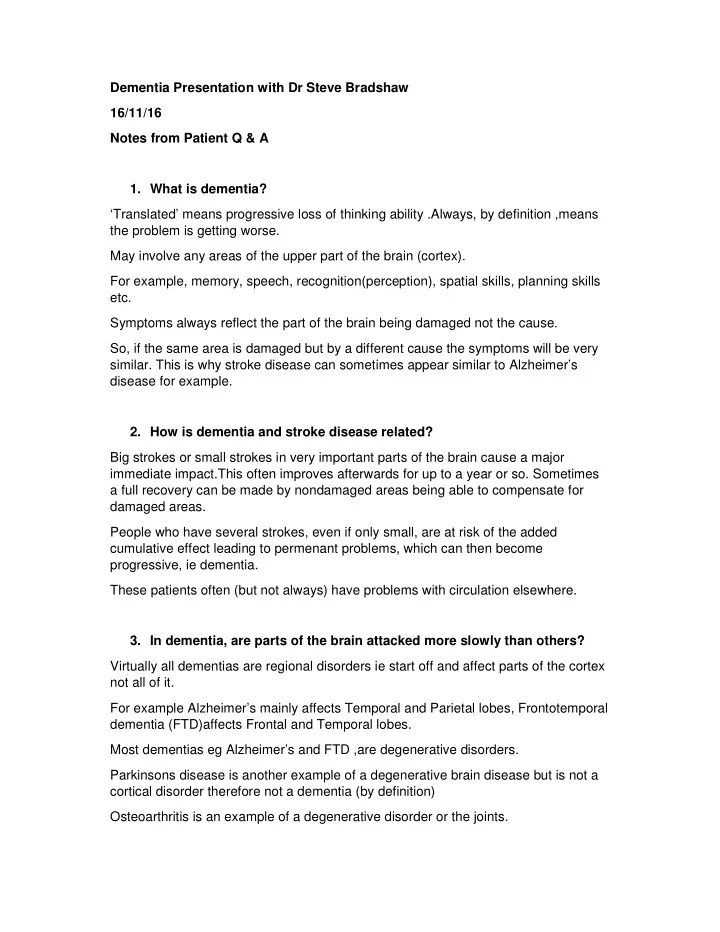

Dementia Presentation with Dr Steve Bradshaw 16/11/16 Notes from Patient Q & A 1. What is dementia? ‘Translated’ means progressive loss of thinking ability .Always, by definition ,means the problem is getting worse. May involve any areas of the upper part of the brain (cortex). For example, memory, speech, recognition(perception), spatial skills, planning skills etc. Symptoms always reflect the part of the brain being damaged not the cause. So, if the same area is damaged but by a different cause the symptoms will be very similar. This is why stroke disease can sometimes appear similar to Alzheimer’s disease for example. 2. How is dementia and stroke disease related? Big strokes or small strokes in very important parts of the brain cause a major immediate impact.This often improves afterwards for up to a year or so. Sometimes a full recovery can be made by nondamaged areas being able to compensate for damaged areas. People who have several strokes, even if only small, are at risk of the added cumulative effect leading to permenant problems, which can then become progressive, ie dementia. These patients often (but not always) have problems with circulation elsewhere. 3. In dementia, are parts of the brain attacked more slowly than others? Virtually all dementias are regional disorders ie start off and affect parts of the cortex not all of it. For example Alzheimer’s mainly affects Temporal and Parietal lobes, Frontotemporal dementia (FTD)affects Frontal and Temporal lobes. Most dementias eg Alzheimer’s and FTD ,are degenerative disorders. Parkinsons disease is another example of a degenerative brain disease but is not a cortical disorder therefore not a dementia (by definition) Osteoarthritis is an example of a degenerative disorder or the joints.
In certain areas of the cortex symptoms occur with relatively small amount of damage (eg memory areas)compared to others(eg spatial areas) Certain areas are more vulnerable to stroke than others due to the anatomy of the circulation system. So, in summary, symptoms reflect the area of cortex being damaged and some areas are more resilient than others. 4.Do individuals notice the onset of symptoms themselves? It varies. The relatively rare FTD is associated with total lack of insight. The vast majority of vascular(stroke) or Alzheimer patients have some insight, but will often dismiss/underestimate significance. Common for anxious people to notice ‘memory’ problems. When we are anxious we struggle to pay attention, so we fail to register new info in the first place. This appears like a memory loss,but no-one can remember something that was not learnt in the first place. The prevalence of people in the community with minor ,non progressing memory difficulties is not known. To find out would involve massive community surveys. 5.How to support/stimulate people with dementia. Lots of evidence to suggest it is worthwhile and this probably extends to people with minor memory inefficiencies and arguably to us all! Health of heart and circulation is paramount for all health including the brain. Physical exercise, good management of other co-existing problems -diabetes, high blood pressure etc. Then,try to ‘exercise‘ the brain in other ways eg crosswords, word searches, photos, life story conversations with reminders like pictures, clothes etc ie aide memoire. Spatial practice such as snooker, ping pong. If it is difficult to do it is worth doing! Variety is always important to keep all areas of cortical function engaged and utilized. 6. Capacity/Power of Attorney. As soon as we 18 in the UK it is assumed we have capacity. By law we can understand, retain, weigh in the balance, and communicate. It has to be shown to be lost. We can make legal arrangements for a power of attorney to act for us should we lose capacity.
If we have already lost capacity we cannot do this. It is wise therefore to consider making these legal arrangements whilst able to safeguard against this possibility. Those who have lost capacity without prior arrangements become the responsibility of the court of protection, which is procedurally much more cumbersome and expensive .Ultimately it means the person the court appoints to act for us is chosen for us and would not necessarily be the person we would have chosen ourselves. 7.Research. Relatively underfunded compared with more glamorous areas such as cancer. Indirect benefit of research into vascular diseases. General lifestyle research is very important for dementia risk. Donepezil group of medications first ones shown to have some benefit. Memantine evidence less clear, but slowly accumulating. Research has also been helpful in showing hitherto risks/benefits of drugs used for other conditions eg benefits of low dose aspirin, risk of antipsychotic medication. Most dementias not genetic, but genetic research still relevant as it becomes more sophisticated.
Recommend
More recommend